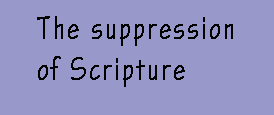The Bible and the
Schools
November 18, 1999
The
principle of the separation of church and state has long been
wrongly ascribed to the U.S. Constitution, which merely forbids
Congress to make laws “respecting” an establishment
of religion or prohibiting its free exercise. The wording of the First
Amendment is so clear that one can only marvel that it has been so
badly misunderstood. Reading comprehension is indeed in decline,
especially among federal judges.
The courts look with special
suspicion on any “intrusion,” as they call it, of religion
in public schools. They have repeatedly ruled that even voluntary
prayer, moments of silence, the posting of the Ten Commandments,
and Bible reading violate the supposed “wall of
separation” between church and state.
 This misguided
“separation of church and state” has sundered American
children from their heritage. Nobody can be fully educated without
knowing the Bible: the stories of creation, Adam and Eve, Cain and
Abel, the Great Flood, Moses and the Exodus, Samson and Delilah,
King David, King Solomon, the sufferings of Job, Jonah, the great
prophets, the fortunes of the Israelites, the life and teachings of
Christ, the Apostles, and the epistles of Paul, not to mention the
Psalms, Proverbs, and Ecclesiastes.
This misguided
“separation of church and state” has sundered American
children from their heritage. Nobody can be fully educated without
knowing the Bible: the stories of creation, Adam and Eve, Cain and
Abel, the Great Flood, Moses and the Exodus, Samson and Delilah,
King David, King Solomon, the sufferings of Job, Jonah, the great
prophets, the fortunes of the Israelites, the life and teachings of
Christ, the Apostles, and the epistles of Paul, not to mention the
Psalms, Proverbs, and Ecclesiastes.
Even William O. Douglas, one of
the most liberal of U.S. Supreme Court justices, once wrote:
“We are a religious people, whose institutions presuppose a
Supreme Being.” We can’t truly know those institutions
unless we know their Biblical foundations.
The same is true of history and
literature. How can you understand the Reformation without knowing
what Catholics and Protestants were fighting about? How can you
understand the full significance of the French and Russian
revolutions without knowing their religious background and their
consequences for religious life?
Nearly all the great literature
of the last millenium also presupposes a knowledge of the Bible.
Dante’s Divine Comedy and Milton’s Paradise
Lost are based in Bible stories and characters. The plays of
Shakespeare are thick with references to the Bible.
Even Huckleberry Finn
assumes that readers will recognize references to Scripture. Mark
Twain himself was not a believer; but he would have been astonished
at the idea that you could be literate without knowing the Bible. The
same is true of irreligious writers like James Joyce, William
Faulkner, and H.L. Mencken.
The great critic Northrop Frye,
who died a few years ago, thought the Bible, with its archetypal
stories, was essential to what he called “the educated
imagination.” Western culture — music, painting, poetry,
fiction, architecture, politics — is saturated with Biblical
lore; English literature could hardly exist without phrases from the
King James translation.
The Bible has shaped the way
we think of ourselves. Until recent times, educated men saw
themselves and their history in Biblical terms; they saw history as a
great story of salvation. In politics they justified themselves with
Scriptural arguments, as in supporting or opposing war, rebellion,
and slavery.
You can’t understand
Greek and Roman culture without reading the works of Homer and
Virgil. It would be absurd to tell a Buddhist or a Hindu he could
understand Western culture without reading the Bible; but that, in
effect, is what we have been telling our own children!
The banning of the Bible in
public schools has imposed a massive ignorance on those children. It
makes them uncomprehending of nearly every other subject,
including the sciences, which arose in both response and reaction to
Biblical teachings. In other words, you have to read the Bible even to
understand atheism!
The thinness and crassness of
contemporary American culture — instantly visible in movies
and television — is largely due to Scriptural ignorance.
It’s true that Americans take little interest in history in any
form; but their history, including their European ancestry, is
inseparable from an ancient Christian culture, rooted in the Bible.
The problem is compounded by
the fact that professional educators themselves know so little about
Scripture that they no longer realize that anything essential is
missing from their curricula. So they transmit their own ignorance
without knowing it.
In the profound words of the
nineteenth-century Anglican bishop Richard Whately: “He who
is unaware of his ignorance will be only misled by his
knowledge.” That is one of the harshest judgments on modern
education: that it propagates not only its ignorance, but unawareness
of its ignorance.
Joseph Sobran
Archive Table of Contents
Current column
| FGF E-Package columns by Joe Sobran, Sam Francis, Paul Gottfried, and others are available in a special e-mail subscription provided by the Fitzgerald Griffin Foundation. Click here for more information.
|


